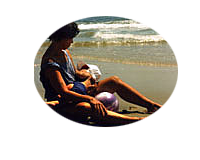Previous
•Medical Conditions - Certain medical or obstetrical diagnosed by a physician. Such conditions may include, but are not limited to, excessive bleeding, maternal infection, and multiple births.
•Mutiples - Twins have become more possible to birth in water, particularly in Ostend, Belgium at the Aquatic Maternity Centre in the Henry Serruys Hospital. In seventeen years, over 2,500 aquatic births with no infections or deaths from drowning have transpired at this Hospital. Dr. Ponette, chief OB-GYN assist women with breech, twins presentations. If you were working with a facility or obstetrition with limited experience in the world of water, it would best to change your plans or travel to a facility that will support your choices.
 |
•Severe Meconium - Meconium is another word for feces. If there is moderate to severe meconium in the amniotic fluid, waterbirth is not recommended. Mild to moderate meconium is fairly normal. Since meconium usually floats to the surface in a tub it can (and should) be removed from the tub promptly. It has been seen that meconium washes off the face of the baby and even comes out of the nose and mouth while the baby is still under water. If the water is stained and birth is imminent, the woman can lift her pelvis out of the water to birth the infant.
•Shoulder Dystocia - This is usually considered an obstetric or midwifery emergency by most. Protocols require the mother who is anticipating a large baby to leave the water. Now there are some that find it is easier to assist a shoulder dystocia in the water. It is believed that tight shoulders happen more often because of mom or caregiver trying to push before the baby fully rotates. Better to wait a few contractions and allow baby to rotate. Because position changes in water are so much easier than dry land, a quick switch to hands and knees or even standing up with one foot on the edge of the pool helps to maneuver baby out. The water can be draining from the pool at the same time.
•Toxemia - Abnormal swelling, diet related.
•Water Temperature - Too warm -- Mother's body temperature rises, energy is sapped. Suggestion: Have woman hold on to ice cubes, suck on a cold washcloth,or drink cold water. Too cold -- Mother's body temperature will drop the sweating mechanism for heat loss doesn't work in water. Too early -- If the woman gets into the tub too early (during the first stage of labor), labor may stall or slow down.
